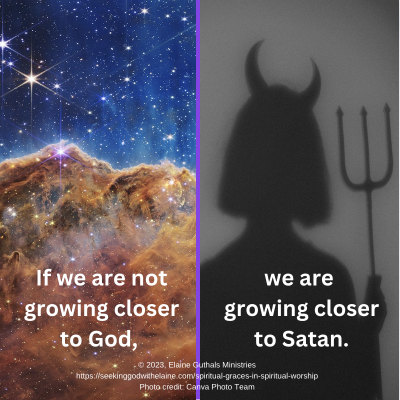Spiritual graces must be present for perfection. This devotional reading looks at how these spiritual graces are present in worship.
Nuggets
- Our spiritual graces show how we use or morals to worship God.
- We must diligently worship the right way.

As we look at completing our discussion of Menander and Charnock’s sermon Spiritual Worship, Charnock outlined how we make use of all we have considered. The last devotion looked at how we use the information we have gleaned.
Resource
Charnock has a second subpoint under his first point that we didn’t’ address in the last devotion. It has to do with diligence, which is a spiritual grace.
The second point is examination. It mainly talks about the before and after aspects of worship.
But it also talks about spiritual graces.
So, we are going to rearrange Charnock’s points. We’ll look at spiritual graces today and end our look at Charnock’s sermon in the next devotion with an overview of worship. We’ll end the study with the determination of how we find Jesus in our worship in the devotion after that.
So, now that we have the game plan, let’s dig into spiritual graces.
Let's Put It into Context
To read devotions in the Habitual Holiness of Heart and Life theme, click the button below.
Here is a running list of nuggets for the theme.
Devotions in the Finding Jesus through Spiritual Worship study
Here is a running list of nuggets for the study.
The foundation of this series is Menander and Charnock’s Spiritual Worship.
Resource
The blue headings are Charnock’s words.
Spiritual Graces in Worship
“And now, dear brothers and sisters, one final thing. Fix your thoughts on what is true, and honorable, and right, and pure, and lovely, and admirable. Think about things that are excellent and worthy of praise” (Phil. 4: 8 NLT)
How do we act our graces in worship?
Our spiritual graces show how we use or morals to worship God.
Charnock didn’t give us a verse to support his question. But being good disciples, we should know what God wants.
We’ve talked before about what spiritual graces are. I know this isn’t an exhaustive list, but we talked about having honesty, fairness, inner peace, forgiving, and purity while being diligent, sober, and hopeful.
To read a devotion in the Morality Leads to Godliness series, click on the button below.
I think I would add humility, obedience, patience, love, and detachment from the world.
We see how that list forms our character, but what do they have to do with worship?
Our worship must be true, honest worship of Sovereign God. Our focus must not be elsewhere. We worship God because we love Him.
We must worship God because we believe He is Sovereign God. Worshiping Him because of Who He is must be the foundation. We would humbly worship Him.
Worshiping God brings us inner peace. Part of this is because God is forgiving.
We have to worship God in purity. If purity means without sin, our worship has to be true worship God’s way. We would be obedient in our worship.
If sober means self-control, genuineness, and sound moral judgment as evidenced by a calm and temperate disposition, sober worship would follow those lines. I would say it would be respectful and consistent.
Our worship of God brings us hope. True worship will be rewarded with eternal life.
Diligence in Outward Worship
“Write this letter to the angel of the church in Sardis. This is the message from the one who has the sevenfold Spirit of God and the seven stars: ‘I know all the things you do, and that you have a reputation for being alive — but you are dead’” (Rev. 3: 1 NLT)
Diligence in outward worship is not to be rested in (Revelation 3:1).
We must diligently worship the right way.
Sardis was one of the churches that received a letter from Jesus in Revelation. That isn’t necessarily a good thing.
On the surface, others could see that they loved God. They stood up to persecution. They had the works and the programs going that a church of God should have.
The problem Jesus had with them was they were fake. They looked like they were doing what they were supposed to be doing.
The operative word is looked. They really weren’t.
We don’t know what the actual problem was. It could be they were Matthew 7: 21 people, formalists, or nominalists. It could be they had compromised with the world. It could be they were holding onto sin. It could be they tried for salvation without sanctification.
- A formalist is a person who gives the appearance of being a disciple but, in reality, isn’t.
- Nominal disciples are those boasting they love God without even trying to imitate Him — those who dig on religion and its rituals without having a change in heart.
- Salvation is the gift of life through the deliverance from condemnation and sin to acceptance and holiness and changes us from being spiritually dead to spiritually alive.
- Sin is not believing that Jesus is our Savior to save us from our actions by humans that disobey God and break one of His reasonable, holy, and righteous laws and commandments, goes against a purpose He has for us, or follows Satan’s promptings.
- Holy means to be set apart — because of our devotion to God — to become perfect, and morally pure while possessing all virtues and to serve and worship God.
- Perfection means we reach a state of maturity because the combination of the spiritual graces form, when all are present, spiritual wholeness or completeness — holy, sanctified, and righteous.
- Spiritual graces are worldly morals that have been submitted to God to further His kingdom instead of enhancing this world.
- Sanctified means to be set free from sin.
- Righteous means we are free from sin because we are following God’s moral laws.
- Pure means not being sinful or having the stain of sin.
- Virtues are standards of moral excellence.
- Perfection means we reach a state of maturity because the combination of the spiritual graces form, when all are present, spiritual wholeness or completeness — holy, sanctified, and righteous.
- Holy means to be set apart — because of our devotion to God — to become perfect, and morally pure while possessing all virtues and to serve and worship God.
- Holiness is the transcendent excellence of His nature that includes elements of purity, dedication, and commitment that lead to being set apart.
- Purity means possessing God’s moral character, having eliminated the stain of sin.
- Spiritual death is the spiritual separation from God that occurred as a consequence of Adam and Eve’s original sin.
- The spiritually alive are those who have ABCDed, so they are no longer separated from God.
- Sin is not believing that Jesus is our Savior to save us from our actions by humans that disobey God and break one of His reasonable, holy, and righteous laws and commandments, goes against a purpose He has for us, or follows Satan’s promptings.
- Sanctification is the transformational process of the mind, body, and soul, which begins with regeneration; gradually changes our nature and morals through the promptings of the Holy Spirit; and ends with perfected state of spiritual wholeness or completeness.
- Regeneration is being changed from spiritually dead to spiritually alive and the internal new birth and requickening that God brings about through the work of the Holy Spirit to give us new character.
Glossary
The ABCDs of Salvation
If you have not become a believer in Christ, please read through the
Plan of Salvation and prayerfully consider what God is asking you to do.
A – admit our sins
B – believe His Son Jesus is our Redeemer
C – confess God as Sovereign Lord
D – demonstrate that commitment by making any changes needed in our lives to live the way in which God has called us
The Disciple’s Job Description
Mackennel thought they weren’t being diligent in their service of God. They didn’t follow through on their work for God. Their works weren’t complete.
Oh, they were doing some work, but the work didn’t really honor God. “Wake up! Strengthen what little remains, for even what is left is almost dead. I find that your actions do not meet the requirements of my God” (Rev. 3: 2 NLT).
All we know was that, regardless how the outside looked, Jesus saw their hearts, and they weren’t right.
We know that diligence is important. It has several related words – consistency, perseverance, endurance, and discipline.
Mackennel made a sad observation. He wrote, “The call to repentance, too, lacks something which we are accustomed to find in God’s appeals to His people: ‘Become watchful, and stablish the things,’ etc. There is no hint that what has perished may be restored.”
Resource
It doesn’t say watch. It says wake up.
The one has us looking for the threat without. The one here has us looking for the threat within.
We like the think that God is always near calling on us. We picture Jesus always knocking on our door. (Rev. 3: 20).
Does God resign Himself that we aren’t going to repent and back off? He was still pleading with the church, but half-heartedly.
Were some of the people of Sardis so mired in the sin that they couldn’t repent?
But what does this say about Sardis’ worship? It would be easy to think that their motivation is wrong.
Spiritual worship is about how God has called us to worship. It isn’t about us worshiping any way we desire.
We must follow God’s leading and worship Him His way.

This is evidence that we can’t just be a good person. Rogers put it this way. He wrote, “Where the life of godliness fails, it were vain to look for its fruits.”
Resource
Being a disciple isn’t just in name only. We have to love God to be a disciple.
When our worship is wrong, we lead others to worship wrong. We are to lead them to God, not away.
We can’t be disciples in name only. We must be totally committed to God.

Making the Connections
Rogers talked about the slide the church at Sardis experienced. It had been a growing church. They were doing things the right way.
The church had experienced a gradual decline, according to Rogers. It was so gradual that they didn’t realize it.
That is how Satan gets a toe into our churches. He sneaks in. Then he takes over.
Don’t think that, just because we have experienced salvation, that this doesn’t happen. This halos when there is salvation without sanctification.
If we are not growing closer to God, we are growing closer to Satan.

We know we can’t earn salvation, but works play a part in sanctification. This shows us it really isn’t about our actions. Our motivation is as important as what we are trying to accomplish.
What we are trying to accomplish must be kingdom related, not world elevation.
Rogers tells us why that is so important. He wrote, “This [having a reputation of being alive but being dead] is displeasing to Christ, because of its gross inconsistency, because of the false aspect which it gives to His kingdom before the world, and because of the [dishonor] which it casts upon the office of the Spirit of God.”
Resource
Our worship must honor God, or it isn’t worship.
How Do We Apply This?
- Let Jesus see, when He looks at our hearts, that they are right.
- Stick to what God has called us to do.
- Learn what we are doing wrong and correct it.
- Learn what we can and should be doing and do it.
- Be committed to Christ.
- Seek God to access the means of revival.
Resource
Father God. We praise You as the holy, righteous Sovereign God. Lord, we worship You with our lives. Amen.
What do you think?
Leave me a comment below (about this or anything else) or head over to my Facebook group for some interactive discussion.
If you don’t understand something and would like further clarification, please contact me.
If you have not signed up for the email providing the link to the devotions and the newsletter, do so below.
If God has used this devotion to speak with you, consider sharing it on social media.